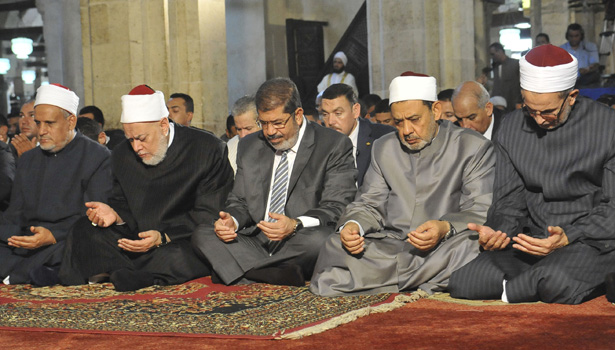The Muslim Brotherhood's 213-Year Revolution
Some believe Egypt's uprising began on January 25th, 2011. The Ikhwan begs to differ.

Two years ago this week, a popular uprising ended Hosni Mubarak's thirty-year reign. Egypt's revolution is still churning, of course, and that country is now deeply polarized between the ruling Muslim Brotherhood, which has embraced many of Mubarak's autocratic tendencies in its attempt to consolidate power, and a non-Islamist opposition that fears theocratic rule in Egypt. Yet the Brotherhood and its opponents don't only disagree on what Egypt's post-Mubarak polity should look like; they also apparently disagree on when Egypt's revolution actually started, and what Egyptians really revolted against.
Indeed, for the Muslim Brotherhood, Egypt's revolution has been going on for centuries, and essentially boils down to a long-term effort to resist western political influence and secularism, which it views as a foreign cultural import.
To understand this hostile historical view, it is worth examining Muslim Brotherhood party leader Abdel Mawgoud Al-Dardery's recent talk at the Council on Foreign Relations. "Many think that the Egyptian revolution only started on the 25th of January [2011]," Al-Dardery told an audience of Washington policy wonks last week. "But I think the revolution was in the making for so many decades before that." According to Al-Dardery, Egypt's revolution took "213 years," beginning with resistance to Napoleon's invasion of Egypt in 1798 and intensifying with resistance to Britain's invasion of Egypt in 1882.
"These two colonial attempts created a state of confusion not only in the Egyptian culture and political development, but also inside the Egyptian minds," said Al-Dardery, citing British controller-general of Egypt Lord Cromer's establishment of an Egyptian educational system to produce, in Cromer's words, "de-Muslimized Muslims." Al-Dardery then traced this foreign attempt to secularize Egypt in the writings of Egyptian thinker Taha Hussein, who "wrote a whole book about ... which direction should Egypt take. Should it take the European direction or the Islamic direction? And in the writings of Taha Hussein, his vision was Egypt had to go European. It had to do everything the Europeans did in order to be able to create a new renaissance for Egypt."
According to Al-Dardery, Hussein's embrace of European values and development "was not ... welcomed very much by the traditional thinkers and the Islamists at that particular time." But the 1952 military coup and the successive Nasser, Sadat, and Mubarak regimes prevented Egyptians from providing "a popular answer" to the question of whether Egypt should embrace European secularism or Islamism.
Thus, Al-Dardery said, the significance of Egypt's 2011 uprising was that it represented the first opportunity for Egyptians to finally answer collectively, "What is the future of Egypt? Where Egypt should go?" And the Muslim Brotherhood's successive electoral victories have legitimized its preferred formula, which reconciles "the Islamic tradition with ... Euro-American developments." Al-Dardery traced this approach back to late nineteenth- and early twentieth-century Islamic thinkers such as Muhammad 'Abduh and Rashid Rida, as well as Brotherhood founder Hassan al-Banna, who aimed "to take from Europe the best we could, add it to the best traditions we have, and try to create the third alternative."
It bears emphasizing that this "third alternative" takes "Euro-American developments" - specifically western scientific advances and administrative procedures, such as electoral politics - but uses them to advance the Brotherhood's "Islamic tradition," which emphasizes "instituting the sharia" and, thereafter, building a "global Islamic state." This approach makes it different from, say, traditional Salafists, who until recently largely rejected western advancements as illicit "innovations." But the Brotherhood's approach ultimately views western values - such as political secularism and pluralism - as imports against which, according to Al-Dardery, Egyptians have been fighting for 213 years.
This is, of course, not what motivated most of the revolutionaries who bravely took to Tahrir Square two years ago, demanding political freedom and touting their ecumenism. But the Islamist organization that seized the revolutionaries' initial momentum has been fighting a very different battle for nearly a century, and Washington should note that the Brotherhood essentially views Egypt's revolution as part of an ongoing struggle against western influence and values. One of the Brotherhood's own spokesmen, after all, said as much in Washington.
(Katie Kiraly, the author's research assistant, transcribed Al-Dardery's remarks.)